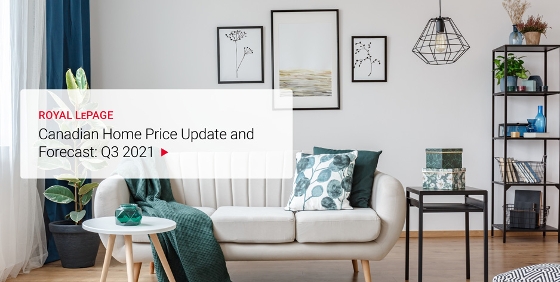National aggregate home price increases 21.4% year-over-year
Third quarter highlights:
- Royal LePage maintains its 2021 forecast, with the national aggregate home price expected to rise 16.0% in Q4, compared to a very strong Q4 2020
- Very low inventory pushes potential buyers to sidelines amid national housing supply crisis, resulting in pent-up demand
- 5% of regions surveyed saw double-digit year-over-year aggregate price growth in Q3
- Condominiums continue price rebound in urban centres as return to ‘new normal’ allows Canadians to enjoy more aspects of city life

According to the Royal LePage House Price Survey released today, the aggregate[1] price of a home in Canada increased 21.4% year-over-year to $749,800 in the third quarter of 2021. Market activity slowed as a result of a chronic lack of inventory, a persisting challenge for housing markets from coast-to-coast, coupled with the seasonal summer slowdown.
"During the third quarter, the torrid pace of home price appreciation moderated as both demand and inventory waned, a typical summer market trend in a very atypical year. With easing pandemic restrictions, there was finally something to talk about other than real estate, and people began travelling and socializing again," said Phil Soper, president and CEO of Royal LePage. "In addition, a year of relentless competition for too few properties drove some would-be purchasers to the sidelines as buyer fatigue set in. Yet their fundamental need or desire for a new home remains and we are seeing pent-up demand grow. We expect another unusually busy winter season building to a brisk 2022 spring market."
The Royal LePage National House Price Composite is compiled from proprietary property data, nationally and in 62 of the nation’s largest real estate markets. When broken out by housing type, the national median price of a single-family detached home rose 25.2% year-over-year to $790,000, while the median price of a condominium increased 13.0% year-over-year to $533,600. Price data, which includes both resale and new build, is provided by Royal LePage’s sister company RPS Real Property Solutions, a leading Canadian real estate valuation company.
Boosting all segments of the housing market, with more immediate benefits for the condominium sector in large urban centres, immigration will continue to be a critical driver of housing demand. The Royal LePage Newcomer Survey showed that the average duration before newcomers purchase a home is three years after arrival and, nationally, 64% rent their first home.[2]
"While detached houses in suburban and smaller city communities continue to be the primary driver of Canada’s aggregate house price growth, we are seeing prices leveling in many of these regions and expect future growth to track closer to historical norms," said Soper. "While the price gap between houses and condominiums widened during the pandemic, that too should reverse itself in the months ahead, as buyers see condo units as good value for money. In addition, the revitalization of our cities, as employees return to offices and the businesses that serve them reopen, is driving renewed interest from investors eager to provide much-needed rental accommodation."
Royal LePage is forecasting that the aggregate price of a home in Canada will increase 16.0% to $771,500 in the fourth quarter of 2021, compared to the same quarter last year. This forecast is consistent with the company’s previous update in July, 2021.
"Looking back to the late spring of 2020, the Royal LePage benchmark value of a home was $580,000. The subsequent ‘Covid-catalyst’ which drove legions of Canadians to upgrade their living situations, has created a period of exceptional home price growth with real estate values on track to grow 33% by year end," concluded Soper.
Greater Vancouver Regional Summary
The aggregate price of a home in Greater Vancouver increased 20.8% year-over-year to $1,221,400 in the third quarter of 2021. Broken out by housing type, the median price of a single-family detached home increased 23.4% to $1,651,900, while the median price of a condominium increased 8.7% to $697,000 during the same period.
"Vancouver and the surrounding greater region remains firmly in a seller’s market. Although activity showed signs of slowing modestly in the summer and early days of September, the market has picked up again, now that families are back in their usual routines," said Randy Ryalls, general manager, Royal LePage Sterling Realty. "With inventory as low as it is, competition remains tight in every segment of the market. Most listings receive multiple offers, and it’s very common to sell above the asking price."
Ryalls noted that having approximately 15,000 available listings in Greater Vancouver is considered a balanced market. The region currently has less than 9,000 listings.
"Supply would essentially need to double in order to meet the current demand. As a result of the shortage, prices continue to rise, forcing some buyers who have been priced out of the single-family detached market to purchase condominiums instead," said Ryalls.
In the city of Vancouver, the aggregate price of a home increased 12.0% year-over-year to $1,326,600 in the third quarter of 2021. During the same period, the median price of a single-family detached home increased 14.0% to $2,399,600, while the median price of a condominium increased 2.2% to $766,800.
Royal LePage is forecasting that the aggregate price of a home in Greater Vancouver will increase 15.0% in the fourth quarter of 2021, compared to the same quarter last year. This forecast is consistent with the company’s previous update in July, 2021.
"With no major relief to the inventory shortage on the horizon, I expect strong demand will continue to put upward pressure on prices, and that competition will persist through 2022," added Ryalls.
Interprovincial migration has put further strain on housing in British Columbia. According to a recent StatsCan report, British Columbia saw the largest increase in interprovincial migration nationally in 2020/2021, welcoming more than 34,000 Canadians from out-of-province. This was also the province’s biggest gain since 1993/1994.[3]
Royal LePage House Price Survey Chart: rlp.ca/house-prices-Q3-2021
Royal LePage Forecast Chart: rlp.ca/market-forecast-Q3-2021



Comments:
Post Your Comment: